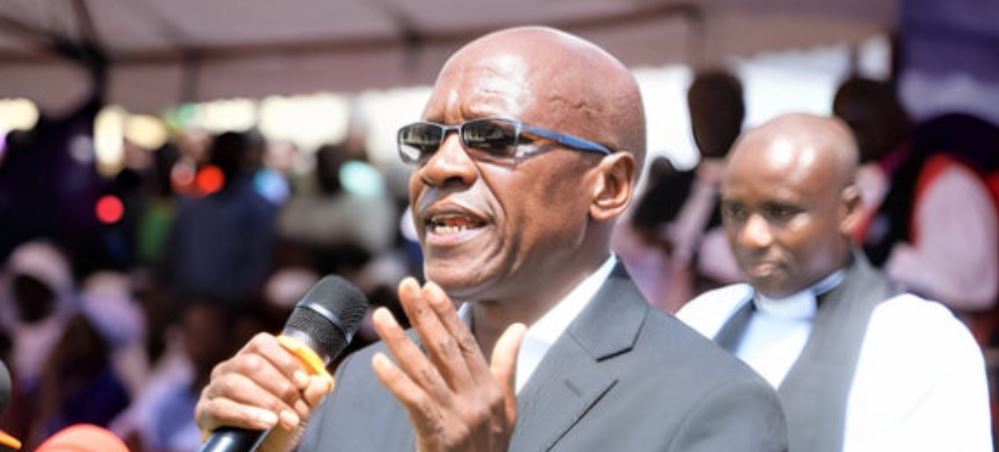It is now emerging that the US government had expressed reservations in the appointment of Michael Gichangi as the head of the intelligence service.
In a cable dated January 2006 and leaked by Wikileaks a few years ago, the Nairobi embassy wrote that President Kibaki had made a big mistake replacing the very professional Wilson Boinett with a relatively untested Michael Gichangi.
The cable stated that Boinett was US government’s main ally in the fight against terrorism.
“Boinett’s replacement by an untested Brigadier Gichangi — selected through a process that reeks of tribal cronyism and the use of all instruments of power to stay in power through (and beyond) the 2007 elections — is anything but reassuring.” the cable said.
The embassy credited Boinett with transforming the NSIS from a domestic political tool into a modern professional intelligence service with an emphasis on external threats.
Perhaps the Americans worries were justified, with the never ending terror attacks and an agency seen to be doing too little.
Here’s the entire cable
Classified By: PolCouns Michael J. Fitzpatrick, Reasons: 1.4 (B,C,D)SUBJECT: Kenya Gets a New Intelligence Chief1. (C) SUMMARY: President Kibaki’s January 16 removal of Brigadier (ret.) Boinett as head of Kenya’s National Intelligence Service (NSIS) removes the USG’s main ally in the counter-terror struggle and one of the few remaining true professionals at the highest level of the Kenyan Government. Boinett’s replacement by an untested Brigadier Gichangi — selected through a process that reeks of tribal cronyism and the use of all instruments of power to stay in power through (and beyond) the 2007 elections — is anything but reassuring. END SUMMARY.OUT WITH THE OLD…===================2. (U) Kenya has a new spy chief. President Kibaki late January 16 named Air Force Brigadier Michael Gichangi, previously the director of the National Counter-Terrorism Center, as the Director General of the National Security Intelligence Service (NSIS). Kibaki’s decision ends both the seven-year reign of Brigadier (ret.) Wilson Boinett, and months of jockeying to replace him.3. (C) Boinett transformed the NSIS from a domestic political tool into a modern professional intelligence service with an emphasis on external threats. A former aide-de-camp to President Moi and the last director of the Special Branch (NSIS’s predecessor, remembered darkly by most Kenyans mostly for running the Nyayo House political detention center during the years of one-party rule), Boinett survived not only the 1999 demise of Special Branch but also the 2002 end of the Moi regime. Recognizing that change was needed, Boinett’s leadership garnered the NSIS domestic and international respect for its relative apolitical nature and seriousness of purpose. Reorganized to provide internal, external and strategic intelligence to the President, NSIS proved to be the USG’s single-most effective Kenyan partner — bar none — in combating Al-Qaeda and related terrorist threats in Kenya.4. (S) But, in the end, the die was cast for Boinett’s undoing at his birth: he was born into the wrong tribe. An ethnic Kalenjin like former President Moi, Boinett was distrusted from the start of the Kibaki administration by many of those Kikuyu tribesmen closest to President Kibaki. Boinett undoubtedly made matters worse by telling Kibaki and his advisors news they did not like to hear — that Kenya remains vulnerable to al-Qaeda attacks, that tribal conflicts were resurfacing in rural areas, that President Kibaki’s Banana team would lose November’s constitutional referendum, etc.5. (S) The last straw, it appears, was the referendum. Boinett rebuffed efforts to reallocate NSIS resources to aid the Banana campaign (reftel). The Banana team did indeed lose, and by a huge margin. In recent weeks, Boinett was repeatedly refused access to President Kibaki — for the first time in his tenure. …AND IN WITH THE NEW======================6. (C) As fate would have it, word of Gichangi’s appointment reached Boinett and many senior NSIS officials as they — and Gichangi — were dining at the Ambassador’s residence with a visiting Codel from the House Permanent Select Committee on Intelligence. The NSIS officials — and a visibly angry Police Commissioner Ali — departed dinner “en masse” just as soon as was diplomatically acceptable. (Ali privately relayed he is concerned about the police’s future working relationship with the NSIS — as he himself has had no such working relationship with Gichangi during the latter’s two years as NCTC Director.) Gichangi began showing up for work at NSIS the next morning.BOINETT’S WORDS TO LIVE (AND SPY) BY:=====================================7. (U) Boinett’s farewell remarks January 17 to the NSIS rank and file received widespread press coverage. In a thoughtful and respectful speech, Boinett relayed what he called “five attributes of great consequence” for the managing and sustaining a robust intelligence service. What lessons Boinett chose to pass on to his troops speak volumes about the man — and his concerns for the future of the NSIS. They thus bear repeating.8. (U) ONE: The government should continuously invest in “the character of their gatekeepers and its watchdogs.” TWO: The NSIS Director General “should have direct and unfettered access to the Head of State and Government. In order to earn trust, he has to do things right and the right thing without fear, favor or ill will. In so doing, he must be efficient, loyal and balanced.” THREE: “All men and women of the service must direct all their time and energy towards promoting and projecting that which only serves and informs the national interest. FOUR: The Service should operate within the law.” FIVE: The Intelligence Service is a national insurance for counterintelligence. Yet a balance has to be struck between the national security interests and international threats and challenges. Information-sharing with other nation states has been the practice from time immemorial. These partnerships will need to be maintained, taking into consideration mutual respect, national interests, international law and the nature of power and its influence in a globalized environment.”BIO NOTES=========9 (C) BIO NOTE: Brigadier Michael Gichangi is an ethnic Kikuyu, the President’s tribe which (along with the smaller, affiliated Embu and Meru tribes from the Mt. Kenya area) has an increasing lock on major power positions in the Kibaki government. Gichangi is reportedly close to both Cabinet Secretary Muthaura and former Security Minister ChristopherSIPDISMurungaru. During his just-concluded tenure as head of the National Counter-Terrorism Center, Gichangi fought tooth and nail against the creation of a Joint Terrorism Task Force designed to bring police, prosecutors and intelligence experts into a joint team. Relatively new to NSIS, Gichangi is as well-known for being a political operator as he is a military professional.10. (U) BIO NOTE (Cont.): Gichangi was born September 9, 1958 in Kirinyaga District, Central Province. A Mang’u High School Alumni, Gichangi joined the Kenyan Air Force as an F-5 pilot in 1977. In 1982 he became an F-5 instructor. From 1986-1991, Gichangi served as a staff officer (planning) at KDoD Headquarters, Nairobi. He worked in a UN observer force in Iraq, 1992-93. He served as an instructor at the Defence Staff College, 1993-96 in Karen, Nairobi. From 1996-97, Gichangi served as a commanding officer of the Air Force’s Flying Wing. He then served as Commander of the Laikipia Air Base, 1997-2001, before being appointed chief of strategic plans and policy at KDoD Headquarters, where he helped draft the first version of KDoD’s “White Paper” on national defense strategy. He has spent the past two years as the founding Director of the National Counter-Terrorism Center.COMMENT=======11. (C) COMMENT: Boinett is just the latest of a series of competent professionals forced out of the Kibaki administration. Anti-corruption czar John Githongo left last year, frustrated at every turn. Chief Prosecutor Philip Murgor was sacked last May for similar efforts to pursue high crimes. And now Boinett, responsible for the transformation of NSIS into one of Africa’s premier, and apolitical, intel services is shown the door. While Gichangi might surprise us, the methods involved in replacing Boinett with a Kikuyu widely expected to be a willing accomplice in responding to political pressures from State House — perhaps taking NSIS back towards the days of the Special Branch — is troubling. It is the latest in a long line of post-referendum appointments to let tribe trump talent. State House is increasingly willing to drop public pretense as those around President Kibaki angle to do whatever it takes to ensure they stay in power through 2007 — and beyond. Post has let State House know privately that, though this was purely a sovereign decision for Kenya to make, the choice of Gichangi, and the manner of his appointment, puts at risk continued success in our highest joint priority, counter-terrorism.BELLAMY






